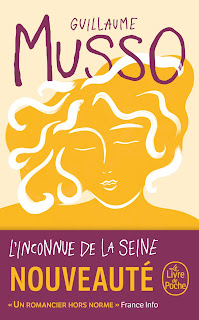L'Inconnue de la Seine - Guillaume Musso
What sets L'Inconnue de la Seine out as great here is perhaps the plotting more than the characterisation, but I don't have too many complaints about the latter. As far as plotting goes, while the introduction of police officer Captain Roxane Montcrestian and her assignment to a strange new posting is somewhat cursory, the first case that immediately falls into her lap is an intriguing one. Not only does it grip you from the start with an outlandish situation, but it manages to continually layer on further mysteries until it seems impossible to resolve, and by the end wraps it all up convincingly without being too neat. You can't ask for more than that, but attention is paid to the detail as well as the mechanics of good narrative and plot structure.
An officer in the BNRF (Brigade nationale de recherche des fugitifs), responsible for hunting down illegals and fugitives, Montcrestian has been handed an unusual assignment working for the Bureau des affaires non conventionelles. BANC, the Bureau of Unconventional Affairs. In fact, she is the only member of the team, a replacement for Commissioner Marc Batailley, who is unwell after a fall and now in hospital in a coma. Unconventional is the word, the bureau set up in the 1970s to monitor cases of supernatural events, telekinesis, hauntings, telepathy, near death experiences and anything out of the ordinary. Surely someone must be messing with her...
...But no, Batailley had an office in the belfry of a tower in the 7th district of Paris and an assistant, Valentine Diakité, a student at the Sorbonne. A message left on the answerphone gives Montcrestian her the first taste of a non-conventional case. A young woman with no memory has been pulled naked out of the Seine and has disappeared from the infirmary leaving little trace of her existence. The unknown from the Seine doesn't remain unknown for long however and is identified by a DNA traces as Milena Bergman, an internationally successful classical musician. The only problem is that Milena Bergman died in a plane crash several years ago.
As if that is not enough, the case becomes even more strange and worthy of investigation by the new captain in charge of the Bureau of Unconventional Affairs. Milena was associated with the author Raphaël Batailley, the son of Marc Batailley. Indications are that the Commissioner was working on investigating something connected with this around the time that he had his accident, leaving Montcrestian with a few leads to follow, the most prominent one being some kind of theatrical connection with Dionysian satyrs and creatures from Greek mythology. None of it seems remotely credible or likely, and yet there it is.
No matter how strange this all appears, coming across as a blend of Sophie Hannah with John Fowles' The Magus it only encourages you to read on to figure out how this can possibly be explained. Musso however remains a little bit broad and sketchy about the characterisation of his main character Roxane Montchrestian. She is somewhat surly, hates what she sees as a city in decline around her, is single minded and butts heads with everyone around her. She doesn't appear to have a home or a private life, and there is little information given about the establishment of BANC, nor much in the way of reaction from her to being landed with such an assignment. The author prefers to get straight into the mystery in the assurance - not misplaced - that it's better to grip the reader before filling in less interesting details.
L'Inconnue de la Seine is nonetheless immensely readable, the kind of book that you just don't want to put down. As a compulsive reader, I don't often say that about books as it's pretty much a given for most books that you enjoy reading, but in this case when I had to put it down, I genuinely couldn't wait to get back to it to see where it might be going next. Each chapter indeed brings a new element, sometimes a cliffhanger situation, but more often just a new piece of information that adds to the mystery. There are a lot of surprising turns here, a great deal of style and originality, with plenty of researched historical, literary and mythological references, all adding up to a gripping unpredictable drama.
Reading notes: L'Inconnue de la Seine by Guillaume Musso has recently been published in mass market 'pocket' paperback by Le Livre de Poche. There are some nice illustrations throughout this edition that form part of the narrative, including relevant background photos, letters, mock newspaper reports etc. Aside from everything else, I was also fascinated to hear about the original l'Inconnue de la Seine, Aurélien, la Joconde du suicide, a young woman fished out of the Seine in the mid-19th century. Her face was so beatific that a death mask was made and copies of it became popular with an an inspiration to writers and artists.




Comments
Post a Comment